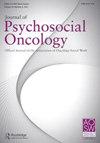性少数群体和性别少数群体癌症患者及其癌症护理提供者在讨论保留生育力方面的差异。
IF 1.5
4区 医学
Q4 PSYCHOLOGY, SOCIAL
引用次数: 0
摘要
背景考虑到与治疗相关的不孕症的可能性,建议癌症医疗人员告知其育龄患者有关生育力保护的信息。对于性与性别少数群体(SGM)癌症患者如何持续进行生育力保护讨论(FPDs),研究尚不充分。偏见和异性恋的影响可能会降低 FPD 的发生率。我们在 SGM 癌症患者样本中确定了 FPD 的频率和相关因素。样本仅限于年龄在 15 岁至 45 岁之间的确诊癌症患者。FPD 采用单项测量。结果癌症诊断时的平均年龄为 34.97 岁(SD = 8.34)。受访者大多为非西班牙裔白人(77.6%),受过大学教育(63.4%),32.6%的受访者报告了 FPD。在多变量模型中,与双性恋者相比,认同为女同性恋(调整赔率 [aOR] = 0.49;95% CI:0.24-0.99)、泛性恋(aOR = 0.34;95% CI:0.12-0.94)或同性恋者(aOR = 0.24;95% CI:0.08-0.70)与 FPD 负相关。结论研究结果表明,在 FPD 中,基于性取向认同的一些 SGM 患者可能会受到偏见的影响,尽管在过去十年中发生的变化可能增加了更多患者的 FPD 频率。需要进行更多的研究来探讨为什么一些育龄 SGM 患者没有得到有关生育力保存的咨询。本文章由计算机程序翻译,如有差异,请以英文原文为准。
Disparities in fertility preservation discussions among sexual and gender minority cancer patients and their cancer care providers.
BACKGROUND
Cancer providers are advised to inform their reproductive aged patients about fertility preservation given the potential for treatment-related infertility. How consistently fertility preservation discussions (FPDs) occur is understudied in sexual and gender minority (SGM) cancer patients. The effects of bias and heteronormativity may reduce the rate of FPDs. We identified the frequency and correlates of FPD in a sample of SGM cancer patients.
METHODS
Data were from the cross-sectional 2020 OUT National Cancer Survey. The sample was restricted to those diagnosed with cancer between the ages of fifteen and forty-five. FPD was measured with a single item. Multivariable logistic regression was conducted to determine factors significantly associated with FPDs.
RESULTS
Average age at cancer diagnosis was 34.97 (SD = 8.34). Respondents were mostly non-Hispanic white (77.6%) and college-educated (63.4%), and 32.6% reported FPDs. In the multivariable model, identifying as lesbian (Adjusted odds ratio [aOR] = 0.49; 95% CI: 0.24-0.99), pansexual (aOR = 0.34; 95% CI:0.12-0.94), or queer (aOR = 0.24; 95% CI: 0.08-0.70) was negatively associated with FPDs compared to bisexuals. Being treated more than ten years ago (aOR = 0.47; 95% CI:0.26-0.85) was also negatively associated with FPDs.
CONCLUSION
Findings suggest potential bias against some SGM patients based on sexual orientation identity in FPDs, though changes over the past decade may have increased the frequency of FPD with patients more broadly. More research is needed to investigate why some SGM patients of reproductive age are not being counseled about fertility preservation.
求助全文
通过发布文献求助,成功后即可免费获取论文全文。
去求助
来源期刊

Journal of Psychosocial Oncology
PSYCHOLOGY, SOCIAL-
CiteScore
4.20
自引率
0.00%
发文量
36
期刊介绍:
Here is your single source of integrated information on providing the best psychosocial care possible from the knowledge available from many disciplines.The Journal of Psychosocial Oncology is an essential source for up-to-date clinical and research material geared toward health professionals who provide psychosocial services to cancer patients, their families, and their caregivers. The journal—the first interdisciplinary resource of its kind—is in its third decade of examining exploratory and hypothesis testing and presenting program evaluation research on critical areas, including: the stigma of cancer; employment and personal problems facing cancer patients; patient education.
 求助内容:
求助内容: 应助结果提醒方式:
应助结果提醒方式:


